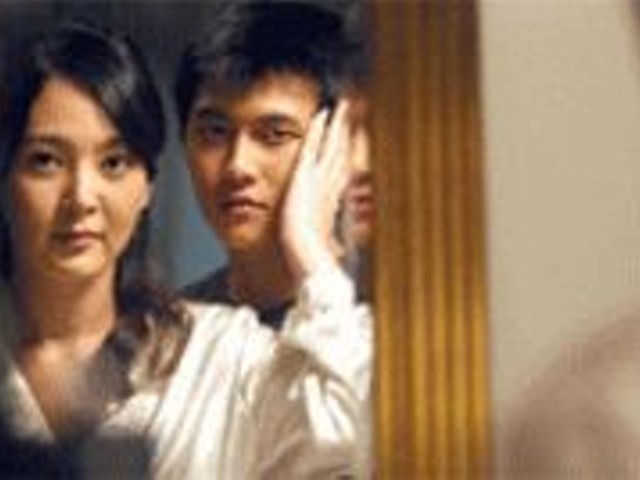Oldboy is such a film. Don't be deceived by its winning the top prize at Cannes; had Quentin Tarantino not been head of the jury, it would have had no chance. This is the kind of movie Tarantino has "geekgasms" over, the sort of thing he'll undoubtedly crib from in years to come. It's a work of art for sure, but a sadistic one. Oldboy is one of the year's best; it just isn't for everyone. If you're still interested, go for it.
We begin with a brief teaser of what's to come, as dramatic music plays and a man with a lion's mane of hair dangles another off the top of a building by his tie. The shaggy-haired man is asked his name, and suddenly we flash back fifteen years, to a drunken sad sack named Oh Dae-su (Choi Min-sik, star of the underrated Chihwaseon: Painted Fire) who, while being held at a police station awaiting bail, repeatedly tries to urinate in the corner and shed clothing. His best friend shows up before the cops get thoroughly pissed off, and they pause at a phone booth on the way home. The next moment, Dae-su has vanished.
He wakes up in a seedy motel room that would not feel out of place in Twin Peaks, U.S.A. Food is brought to him every day, but there is no window, only a television. Desperately, he begs to understand why he's there and how long he'll be there, but his jailers give no answers. Hallucinating visions of ants breaking through his skin and engulfing him, Dae-su tries to stave off insanity by teaching himself to box and by compiling a list of everyone who might hate him for the things he's done wrong. Meanwhile, on the TV news, he sees that his wife has been murdered and that he's the key suspect.
One day, he receives an extra chopstick with his food, which he conceals and begins using to gradually chip away at the mortar in the walls. As he's finally about to make some headway, though, he is released, waking up on the roof of the building, inside a large trunk, wearing a brand-new set of clothes. Fifteen years have passed.
Now boasting a vicious, animalistic streak, Dae-su discovers that his boxing skills work well in the real world, but that his social skills are lacking. Luckily for him, a sympathetic female sushi chef named Mido (Gang Hye-jung) takes him in, agreeing to help discover the identity of his captor.
And here we come to the first curveball thrown by director/co-writer Chanwook Park (Sympathy for Mr. Vengeance). It doesn't take long at all to find the culprit -- a slick, spoiled-looking rich youth named Lee Woo-jin (Yoo Ji-tae). But there is a catch: If Dae-su kills him, he'll never know the motive behind his imprisonment. Ah, but Dae-su can use torture to extract the answer, right? Not so fast. Woo-jin has a delicate heart with a pacemaker, and a remote control that can stop his heartbeat at any time. If he is tortured, he'll kill himself...and Dae-su will never know why. Woo-jin offers a compromise: If Dae-su can discern his motives by July 5, he'll off himself. If not, he'll kill Mido.
If Dae-su were smart, he'd take out Woo-jin first, then figure out the motive. Since the killing would hardly be so satisfying under those circumstances, he instead goes on a quest for the truth, which -- much like the truth at the center of Alan Parker's Angel Heart -- is one he'll later wish he hadn't discovered. Park, having gotten our attention with a standard revenge-story setup, then proceeds to subvert it. There's much darkness at the heart of Oldboy, but also scenes that will make you cheer: a set piece involving Dae-su, a throng of thugs and a hammer; a fantasy-tinged sequence in which Mido explains why lonely people always have hallucinations of ants; and Dae-su's first meal as a free man, a wriggling octopus.
A couple of lapses in logic are a little too conspicuous -- notably the apparent age difference between Dae-su and Woo-jin, despite the fact that the plot ultimately requires them to be about the same age (Choi is actually some fourteen years older than Yoo). One could argue that Dae-su's captivity aged him prematurely, while Woo-jin has the best care money can buy. Of course, Woo-jin is a heart-surgery patient, which comes with its own stresses.
And Woo-jin's master plan, much like the one in David Fincher's The Game, requires that he be able to predict exactly what Dae-su will do in every circumstance, and that he has just about everyone in the city on his payroll. A stretch, but acceptable by movie logic, albeit barely. Oldboy does suggest that everything we see may be either a faulty memory or a hypnotic hallucination, which basically gives the director a one-size-fits-all excuse.
Park's skill helps to gloss over a lot of these flaws, however, and the power of some of his disturbing images is such that you won't be nitpicking, at least not right away. You'll be too busy trembling.





